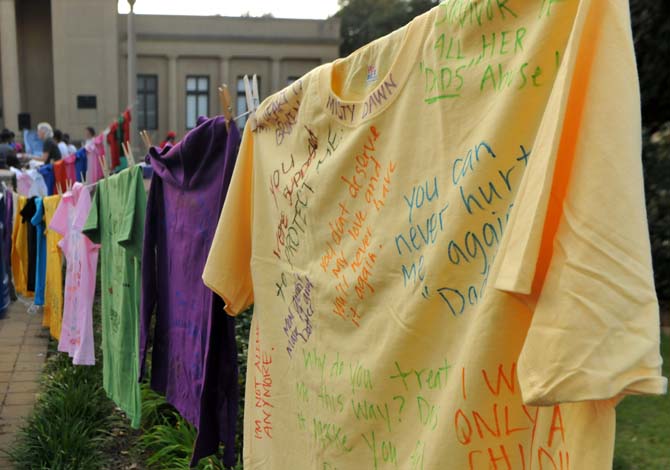When former students recount their college years, most will recall their graduation ceremonies, inspirational professors and numerous typical college experiences. But for some students, college memories are plagued by the thoughts of when they were victims of crime on campus.
On Sunday night, ‘Take Back the Night,’ an annual candlelight vigil and walk near Memorial Tower, served as a memorial for Baton Rouge women and children who have survived violent crimes, including rape, attempted murder and domestic violence.
While the event focuses on the Baton Rouge community as a whole, many students are reminded of crimes close to their temporary home, our campus.
Recount your late night trips to the library or club meetings on campus throughout the year.
The sun goes down, but student life goes on.
To prevent nighttime crime on campus, Student Government and Facility Services hold an annual light walk to ensure that dark areas on campus are lit and broken or obscured lights are fixed.
And while these walks are a step in the right direction, they are not enough to properly protect students on campus.
Numerous universities have installed emergency phones on and around their campuses to report incidents, including suspicious persons, vandalism or other criminal acts. The phones also include a large button that will automatically call for assistance.
The University has a limited number of phones, but not nearly enough. If the University were to invest in installing more of these emergency phones, quicker responses to crimes on campus would follow.
Additionally, the number of crimes against women on and around campus is alarming.
Most recently, a 20-year-old woman was kidnapped and raped on Brightside Drive near Nicholson Drive.
The man, who was described as a white male with bushy hair and a brown mustache, was never arrested.
In spring 2011, an 18-year-old female student was attacked on the Parade Ground near Highland Road at 3:30 a.m.
The list continues, yet little is done to stop these crimes.
Undoubtedly, more precautions, including additional police surveillance and the inclusion of emergency phones, will cost the University a nice little penny, but at the assurance that students are safer on campus than before.
Last fall, Women Organizing Women, a University organization aimed at promoting feminist awareness — and now named Feminists in Action — hosted Holding LSU Accountable, an event discussing current women’s and feminist issues at the University.
One of the central topics of the discussion was the high number of unreported sexual assaults on campus.
Laurel Keys, University alumna and former co-chair of WOW, said sexual assaults are underreported for a number of reasons, but she said it’s important to keep an open conversation going in the community about the issue.
Keys said she knows numerous women who have stated they have experienced some sort of sexual assault and have not reported the incident.
“We wanted to have a round table discussion of issues we’d like to address on campus,” she said. “The point of the event was talking about holding the LSU community accountable to talking more about sexual assault and the resources that are available for victims. Sexual assaults are vastly underreported at LSU, as they probably are at most other college campuses.”
It’s essential that female students know they should report these incidents. After an attack, the details can be painful to recall, but if it goes unreported, the perpetrator will go unpunished.
Violent crimes against women will continue on campus if they aren’t being dealt with, and the University should step up to make an example out of these perpetrators.





